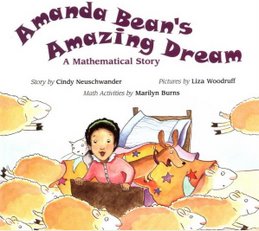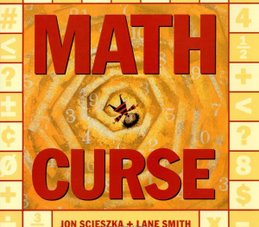When I 'Googled' the string "Famous Mathematicians", I found this website:
http://euler.ciens.ucv.ve/English/mathematics/
It lists various famous mathematicans who (on this website) are all males.
Who are some current female mathematicans we can also expose children to?
Below is the list of the mathematicians:
Niels Henrik Abel
Archimedes
Banach, Stefan
Bessel, Friedrich
Bolzano, Bernhard
Cantor, Georg
Cauchy, Augustin Louis
Cayley, Arthur
Dedekind, Richard
Einstein, Albert
Euclides
Euler, Leonhard
Fourier, Joseph
Galois, Evariste
Gauss, Carl Friedrich
Hilbert, David
Kepler, Johannes
Lagrange, Joseph Louis de
Laplace, Pierre Simon de
Lebesgue, Henri Leon
Leibniz, Gottfried Wilhelm von
de Moivre, Abraham
von Neumann, John
Newton, Sir Isaac
Pascal, Blaise
Peano, Giuseppe
Pythagoras of Samos
Poincare, Henri
Riemann, Georg Friedrich Bernhard
Taylor, Brook
Friday, May 25, 2007
"They [females] are featured as less likely to be involved in the identification, setting and solving of problems, less skilful and competitive, less likely to teach maths skills to others, and to display less initiative and inventiveness."
(Northam, 1986, p. 115)
(Northam, 1986, p. 115)
Reference: Northam, J. (1986). Chapter 8: Girls and Boys in Primary Maths Books. In Leone
Burton (Ed.), Girls into Maths Can Go (pp. 110 – 121). Great Britain: Holt,
Rinehart and Winston.
In the field of education, there has been discussions that teaching others may improve ones understanding of the concepts they are teaching and remember it over longer periods of time. If females, are not as likely as males to teach others math skills, as this quote indicates, what disadvantages may girls compare to boys face in learning mathematics?
Wednesday, May 16, 2007
Image Copyright
Please note that all images on this blog, including book covers, comics, etc. are being used for educational purposes and if the author or artist would like them removed they may post to this blog and I will remove them immediately.
-Melissa
-Melissa
Tuesday, May 15, 2007
"It's too hard..."
 Source: http://w3.impa.br/~jgomes/comics/comics.html
Source: http://w3.impa.br/~jgomes/comics/comics.htmlHere is another math comic.
Any thoughts? Personal connections?
Perceptions of Mathematicians
A study by Colgan (2006) highlights what she found in her study. Students viewed mathematicians as,
“…fat…aren’t seeing anyone, and have wrinkles on their forehead from thinking so hard…bald, overweight, unmarried men who wear beards and glasses and lead little or no social life” (p. 8).
This student is from a recent publication in the 2006 edition of the Ontario Mathematics Gazette. What does this say about how many of today's children view individuals in mathematics professions?
Reference:
Colgan, L. (Sept. 2006). Hey, It’s Elementary! Seeing Ourselves as Children See Us. Ontario Mathematics Gazette, 45 (1), 7-9.
Sunday, May 13, 2007
Math Comic
 Reference: http://www.geocities.com/CapeCanaveral/Hangar/7773/comics.html
Reference: http://www.geocities.com/CapeCanaveral/Hangar/7773/comics.htmlWhat does this comic say about boys' and girls' interest in mathematics?
Trouble Posting?
Hi Everyone,
If you are having trouble posting because you do not have a blog or google account, I have created an account for everyone (who does not have an account) to use if they want to post a comment.
Sign -in email: melissamrp@hotmail.com
Password: melissamrp123
Hope that helps!
-Melissa
If you are having trouble posting because you do not have a blog or google account, I have created an account for everyone (who does not have an account) to use if they want to post a comment.
Sign -in email: melissamrp@hotmail.com
Password: melissamrp123
Hope that helps!
-Melissa
The Rajah's Rice By: David Barry Freeman
 Source: http://www.wautoma.k12.wi.us/redgranite/Classrooms/Mertz/rajahrice.JPG
Source: http://www.wautoma.k12.wi.us/redgranite/Classrooms/Mertz/rajahrice.JPGHere is another math picture book- The Rajah's Rice: A Mathematical Folktale from India.
Who do you think this story may identify or connect to more, males or females? Why?
Knights and Gender
Thank you for the posts thus far.In relation to the comments made about the math picture book in the Sir Cumference series, I wonder what people think the role of women are.
I wonder...
- Thinking back to Medieval Times, what roles would women have played?
- How do you think this may affect the way women are portrayed in this series?
Saturday, May 12, 2007
Sir Cumference and the First Round Table: A Math Adventure
 Source: http://www.amazon.ca/Sir-Cumference-First-Round-Table/dp/1570911525/ref=sr_1_1/702-2639125-2400055?ie=UTF8&s=books&qid=1179331598&sr=1-1
Source: http://www.amazon.ca/Sir-Cumference-First-Round-Table/dp/1570911525/ref=sr_1_1/702-2639125-2400055?ie=UTF8&s=books&qid=1179331598&sr=1-1This is a popular math book read by children and educators.
By looking at the cover's images and text, do you believe a boy or girl child is more likely to relate or enjoy this story? Why?
Quote: Females and Mathematics
“There is an interesting parallel between the decline in girls’ involvement in maths between seven and sixteen years of age, and the gradual disappearance of girls from math books over the same period.”
(Northam, 1986, p. 116)
Northam, J. (1986). Chapter 8: Girls and Boys in Primary Maths Books. In Leone Burton (Ed.), Girls into Maths Can Go (pp. 110 – 121). Great Britain: Holt, Rinehart and Winston.
Northam's (1986) research is the basis for my MRP. This quote from her chapter, Girls and Boys in Primary Math Books, helps frame the importance of my research.
- Why are females not represented in math books as much as males?
- Why are women less likely to get involved in mathematics compared to men?
Any thoughts?
Subscribe to:
Comments (Atom)


